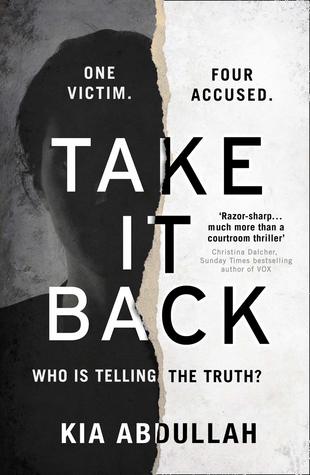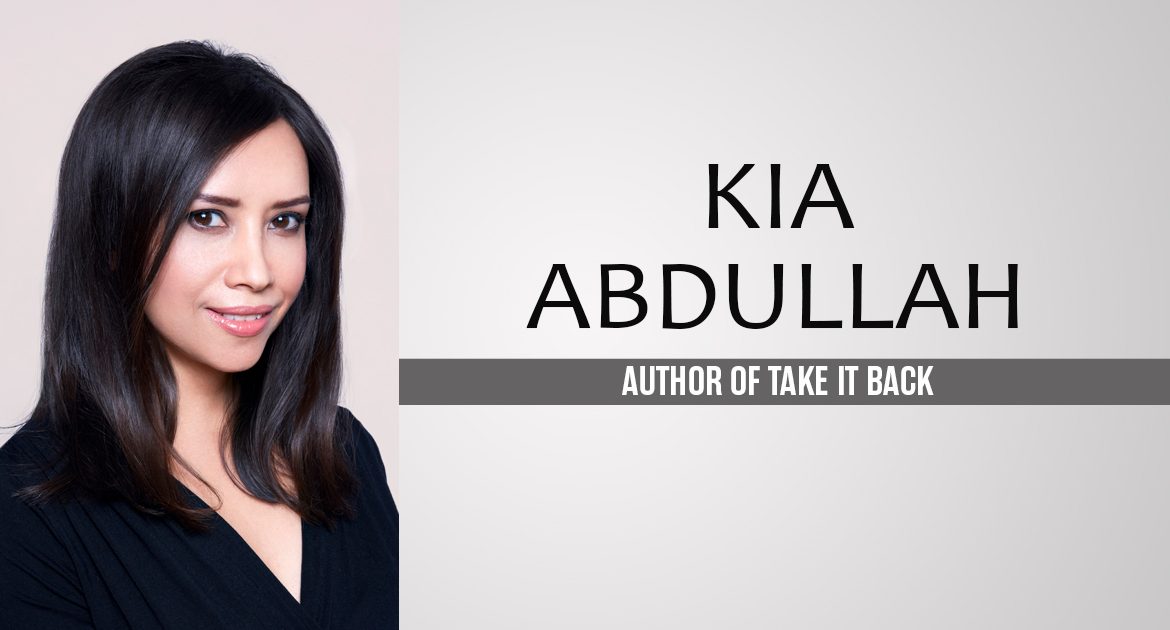Kia Abdullah is an author and travel writer. She has contributed to The New York Times, The Guardian, BBC and Lonely Planet, and is the founding editor of outdoor travel blog Atlas & Boots, read by 250,000 people a month. A native of East London, Kia now lives in Richmond on the edge of Yorkshire Dales National Park. Her new novel, Take It Back, is out in August.
Take It Back

The Victim: A sixteen-year-old girl with facial deformities, neglected by an alcoholic mother. Who accuses four boys of something unthinkable.
The Defendants: Four handsome teenage boys from hardworking immigrant families. All with corroborating stories.
Someone is lying.
My review
Magnificent, gripping and fiercely intelligent, Take It Back is simply stunning. I literally took a day off work, put away my laptop and turned everything off just so I could finish it. There was never a point where I guessed the truth, and every chapter that sped by had me flipping my opinion as to what I believed.
Author’s Corner – interview with Kia Abdullah

Can you tell me something about you that your readers might not know?
I love to travel and have been to about 60 countries. Strangely, there are several major destinations I haven’t yet seen like India and China, but I’ve been to plenty of less trodden countries like Vanuatu, Tonga, Djibouti, Lesotho and Swaziland. I think my love of travel stems from my conservative childhood. My parents were deeply traditional and I had very limited freedom. As an adult, travel feels like the best way to exercise the freedom I now have.
Did you always want to be an author?
I’ve always had a deep attachment to fiction. I’ve written before about how stories were my one way of connecting with my mother who didn’t otherwise have a maternal instinct. I started to write my own stories at around six years old and while I didn’t really understand the concept of ‘being an author’ and making up stories for a living, I knew I wanted to write, whatever guise it took.
What are some of the jobs you had before becoming an author? How have they helped you in your writing career now?
My first job was as a telephone interviewer for a market research company. I was 16 years old and really hated it, but it taught me to bite the bullet and speak to people even when I was daunted by it. This is a really important skill that authors can’t ignore. You can’t just sit in a room and grapple with the page; you have to get out there and champion your work.
I later worked as features editor at a monthly glossy magazine called Asian Woman, which helped me understand the mechanics of the media. As an author, you will likely have a publicist, but the more contacts you can make on your own, the better you will fare.
Can you tell us one or two things you love doing or consider yourself really great at?
I’m not very good at it considering I fell off last month and fractured my hand, but I love horse riding. I’m one of those people who find it very hard to be idle. My mind is always whirring, sometimes productively and sometimes not (hello Twitter). Horse riding is a really effective way to switch off. On occasion I have considered stopping because it costs quite a lot, but my boyfriend says I come home glowing with happiness after a lesson and I don’t want to put a price on that!
Stranded on a tropical island, what would be the top three books you’d have with you?
Anne of Green Gables by L. M. Montgomery because it’s the first book I fell in love with. The Time Traveler’s Wife by Audrey Niffenegger because I love those characters so much. Notes from a Small Island by Bill Bryson because it’s hilarious and it would keep me close to home.
If you could recommend any other book(s) that you’ve read and loved recently, what would it be?
They’re not recent releases, but I read them recently and absolutely loved them: The Secret History by Donna Tartt and The Girls by Emma Cline. They are such exquisite writers. The books centre on murders though, so I’m not sure I’d like to have them with me on a desert island!
Writing Take It Back
Let’s talk about Take It Back. Can you tell my readers a little about it, how you came up with the idea and what inspired you to write it?
Take It Back is a courtroom drama in which the victim, a 16-year-old girl with facial deformities, accuses four boys of something unthinkable. The defendants are four handsome teenagers from hardworking immigrant families, all with corroborating stories.
Former barrister Zara Kaleel takes up Jodie’s case; she believes her, even if those close to Jodie don’t. Together they enter the most explosive criminal trial of the year in which ugly divisions within British society are exposed.
I wrote the novel not just as a thrilling courtroom drama but also as a commentary on how we treat each other based on what we look like or what we believe in; how the media treat you based on what your name might be; and how we do things – good and bad – because we choose to do them as individuals, not because of the colour of our skin.
Describe Take It Back in three words.
Emotional. Thought-provoking. Divisive.
What scene did you enjoy writing most?
There’s a scene in which Zara tells her mother that oppression doesn’t spread through men with guns, or bombs on trains; it spreads when women tell their daughters – gently and with all the love in the world – not to peek above the parapet, instead to stay at home, to be quiet, to be kind, to be good. It was cathartic because Zara says a lot of the things I’ve wanted to say to my own mother for a long time.
What actress would you cast to play Jo?
I’d like to casually say I haven’t thought about it, but I totally have! I think Amber Rose Revah who plays Dina Madani in The Punisher would be an amazing Zara. I first thought so when watching her as Dina and later found out that she was British, which is perfect!
Jodie I’m less sure of. There is so much British talent out there at the moment and I’m sure we could find someone amazing.
Was the ending planned from the beginning or did it evolve as you wrote it?
The ending was 100% planned. I’m a planner through and through. In fact, I have to fight my instinct to over-plan to allow the story to breathe. This applies to my real life too. Militant planning suffocates serendipity so I have to remind myself to chill out!
What do you think readers will love about Take It Back?
I hope they find themselves switching allegiances once or twice. If they do that, then I will have succeeded in creating multi-dimensional characters that have the capacity to surprise the reader. I think readers love being surprised whether that’s by a plot twist, a character’s actions or just an unexpected metaphor. I hope I’ve pulled off one or two of those things.
There are strong themes of religion, culture and feminism in this book. Was that intentional? Can you expand how those themes came about and what attracted you to them in the first place?
That was definitely intentional. I wanted to write a thrilling novel at heart but also a commentary on contemporary issues, both within my community (e.g. tribalism, strict gender roles, cultural expectations) and outside it (e.g. the media’s treatment of certain groups, mob mentality). I think the best fiction not only engages the reader but also says something about the world and I hoped to do that with Take It Back.
I really loved Zara! I found her smart and strong and just really courageous. How did you build her character to match this story so well?
Thank you! Zara was built in layers. The first iteration was much starker and one-dimensional: she was smart and strong and invulnerable, but none of us are really like that. Even the toughest people struggle with things that keep them up at night. I wanted Zara to make mistakes and have vulnerabilities.
I softened her and also expanded on her relationship with her mother, which ended up being an important part of the story. Female characters can be difficult because if they’re too tough, they’re unlikeable and if they’re too soft, they’re seen as weak. I think male characters have an easier time.
What was the most surprising thing you learned while writing it?
I was surprised by the generosity of complete strangers. When I first embarked on the book, I posted a question on reddit asking if any British barristers might be willing to consult on it. Because it’s reddit, I got tons of snarky comments (‘you clearly have no idea how much barristers earn per hour’). I ended up deleting that post and separately contacting a few lawyers. In the end, I had two give me their time for free. One invited me to chambers and the other read the finished book. Between them, they answered over a hundred of my questions. I was blown away by their generosity.
What’s next for Kia?
Are you working on a new book? Can you tell my readers a little about it, a blurb, potential release date, etc? Where did you get the idea?
I’m writing a new book. It’s not a continuation of Take It Back but it follows Zara Kaleel as she works a new case. The working title is The Night Of but that may well change. If all goes well, it should be out next year!
Get in touch
Kia loves connecting with readers. You can get in touch with her at:
Win free books from your
favorite authors
Sign up for my free book club newsletter for chances to win books and read book reviews and exclusive author interviews from authors like Heather Gudenkauf, David Bell, Jane Shemilt, and more.

This is such a fantastic interview. I’m thrilled to hear Kia is working on another book about Zara because I loved her too.
I’m so glad you enjoyed the interview! I loved this book so much and am so glad you did, too! 🙂